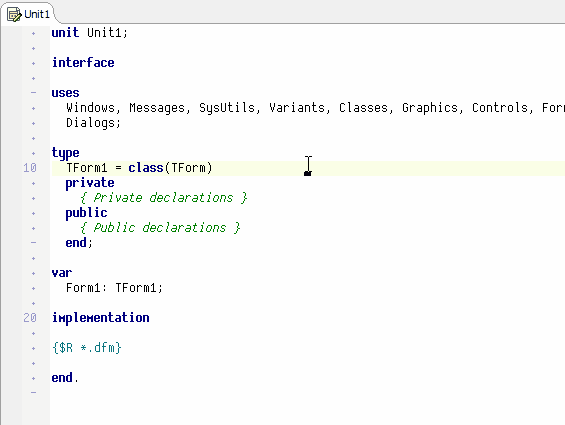Adding a new ShortCut to the Delphi IDE is not too difficult because the Open Tools API provides a service for this. I am trying something apparently more complex: Add a Wordstar like additional ShortCut:
I want something to happen when the user presses
Shift+Ctrl+H followed by the single key X
where X should work regardless of the state of the Shift key.
This is my code:
procedure TGxKeyboardBinding.BindKeyboard(const BindingServices: IOTAKeyBindingServices);
const
DefaultKeyBindingsFlag = kfImplicitShift + kfImplicitModifier + kfImplicitKeypad;
var
GExpertsShortcut: Byte;
ShiftState: TShiftState;
FirstShortCut: TShortCut;
SecondShortCut: TShortCut;
begin
GExpertsShortcut := Ord('H');
ShiftState := [ssShift, ssCtrl];
FirstShortCut := ShortCut(GExpertsShortcut, ShiftState);
SecondShortCut := ShortCut(Ord('X'), []);
BindingServices.AddKeyBinding([FirstShortCut, SecondShortCut],
TwoKeyBindingHandler, nil,
DefaultKeyBindingsFlag, '', '');
end;
So, if I set ShiftState := [ssCtrl] pressing
Ctrl+H X
calls my TwoKeyBindingHandler method.
But with ShiftState := [ssShift, ssCtrl] pressing
Shift+Ctrl+H X
does nothing.
Oddly enough, when specifying ShiftState := [ssShift, ssCtrl] (which should only affect the first key) pressing
Shift+Ctrl+H Shift+X
calls my TwoKeyBindingHandler method, even though the second ShortCut is added without a modifier key.
Any idea? Is this maybe a known limitation/bug of the Delphi IDE/Open Tools API? Is there a known workaround?
I tried it in Delphi 2007 and Delphi 10 Seattle, no difference.
You should be able to do it using the GetKeyState function.
The program has two operations - Think of it as opening a drop down menu item. When ctr-shift-h is pressed your programme will need to flag that the 'Menu' is now open and that subsequent keypresses will either activate an option or close the 'menu' if an invalid key is presses.
function IsKeyDown(const VK: integer): boolean;
begin
IsKeyDown := GetKeyState(VK) and $8000 <> 0;
end;
procedure Form1.OnkeyDown(...)
begin
if Not H_MenuOpen then
if IsKeyDown(vk_Control) and IskeyDown(vk_Shift) and IsKeyDown(vk_H) then
begin
//Some Boolean in the form
H_MenuOpen:=True;
//Will probably need to invalidate some parameters here so that
//no control tries to process the key
exit;
end;
if H_MenuOpen then
begin
if key=vk_X then
begin
//x has been pressed
*Your code here*
//possibly invalidate some of the params again
exit;
end;
//Nothing valid
H_MenuOpen:=False;
end;
end;
OK, since apparently nobody has found an answer, here is what I ended up doing:
I had already planned to show a hint window listing all possible characters for the second key (actually that code was already working fine, using the approach suggested by Helen Fairgrieve in her answer to this question). Instead, I now register only a one-key shortcut:
BindingServices.AddKeyBinding([FirstShortCut],
TwoKeyBindingHandler, nil,
DefaultKeyBindingsFlag, '', '');
And in the TwoKeyBindingHandler method, I show a popup menu which contains those characters as the shortcuts. The IDE/VCL/Windows then handles the rest for me.
This is what it looks like:

It's not an answer to the actual question but it solves my problem. Sorry if you got here expecting something more.
If you love us? You can donate to us via Paypal or buy me a coffee so we can maintain and grow! Thank you!
Donate Us With